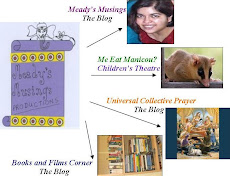I felt a big blow in the stomach for my purple elephant …I have to tell you….I explained about how elephants have feelings…they are very sentient beings (I mean just look at my purple elephant if you don’t believe me) and I had read once in National Geographic that they have funeral rites and rituals and stuff and scientist believe they mourn and grieve for their dead. The individual more went on about how elephants are attacking! Well of course they are wouldn’t you defend your home and family if people came to kill you!? My purple elephant has had many a pink, green and grey elephant cousin killed!
Why if it’s OK to eat elephants well what’s the biggy with eating people too…I mean elephants are really sensitive creatures…I was pretty irritated that the individual then went on to claim elephants have small brains compared to their size when well they had no scientific evidence to back it up…in fact I understand elephants are quite smart...but apart from my personal relationship with my lovely purple elephant here are some scientific facts out there…
Read what Marc Bekoff, a professor in the Department of Ecology and Evolutionary Biology at the University of Colorado in Boulder has to say in his commentary Do Elephants Cry? By clicking on this link here.
Now I know this is an Advent calendar and my objective of it is to bring fun, comfort and joy. So I’m not going to go on about the gory details of the pain that my purple elephant and his relatives can be subjected to…instead I’m going to celebrate the purple elephant and his kind…it is what the purple elephant wants too…he really just wants to live in peace and harmony with other beings in the universe…and for his family it’s Christmas time too…so here is how we are going to celebrate the Purple Elephant and Elephants at large and their gifts today on the Advent Calendar.
- Meady’s Musings-Some scientific facts that show the loveliness of the nature of the elephant…their ability to show love and compassion for each other and even for species other than their own!
- UCP-Elephants have long been revered in Hinduism and Buddhism…and we will explore that…
- Books and Films Corner-Many movies and books have been made about elephants we will talk about one of my favourite elephantine characters!
SOME SCIENTIFIC TIDBITS THAT POINT TOWARDS THE LOVING AND COMPASSIONATE NATURE OF ELEPHANTS
From an October 2006 New York Times Magazine article: "Decades of poaching and culling and habitat loss ... have so disrupted the intricate web of familial and societal relations by which young elephants have traditionally been raised in the wild ... that what we are now witnessing is nothing less than a precipitous collapse of elephant culture.
... [B]efitting of an animal with such a highly developed sensibility, a deep-rooted sense of family and, yes, such a good long-term memory, the elephant is not going out quietly. It is not leaving without making some kind of statement, one to which scientists from a variety of disciplines, including human psychology, are now beginning to pay close attention."
Here are some compelling facts about the true nature of elephants as contained in the a summary of information put forward on the PBS show Unforgettable Elephants-What is the Depth of Animal Emotions? And to be honest after reading this I had to admit to my purple elephant that indeed some elephants are greater ‘human beings’ than many human beings are…to that he just trumpeted!
"Joy
In the wild, joy is an emotion that elephants have no shame in showing. They express their happiness and joy when they are amongst their loved ones-family and friends. Playing games and greeting friends or family members all elicit displays of joy.
But the one event that stirs a level of elephant happiness beyond compare is the birth of a baby elephant. In UNFORGETTABLE ELEPHANTS, the birth of Ebony is one such occasion. The excitement of several of the females in Echo's family can't be contained as they are heard bellowing and blaring during the birth of the new baby.

During an elephant reunion, the excitement visibly flows down the sides of elephants' faces.
Another highly emotional occasion in an elephant's life is an elephant reunion. This joyful meeting between related, but separated, elephants is one of exhuberance and drama. The greeting ceremony marks the incredible welcoming of a formerly absent family member. During the extraordinary event, the elephants about to be united begin calling each other from a quarter a mile away. As they get closer, their pace quickens. Their excitement visibly flows as fluid from their temporal glands streams down the sides of their faces. Eventually, the elephants make a run towards each other, screaming and trumpeting the whole time. When they finally make contact, they form a loud, rumbling mass of flapping ears, clicked tusks and entwined trunks. The two leaning on each other, rubbing each other, spinning around, even defecating, and urinating (for this is what elephants do when they are experiencing sheer delight). With heads held high, the reunited pair fill the air with a symphony of trumpets, rumbles, screams, and roars. Bliss.
Love
There is no greater love in elephant society than the maternal kind. Nobody who observes a mother with her calf could doubt this. It is one of the most touching aspects of elephant social customs. The calf is so small compared to the adult that it walks under its mother, who, incredibly, does not step on it or trip over it. Mother and child remain in constant touch. If a calf strays too far from its mother, she will fetch it. The mother often touches her child with trunk and legs, helping it to its feet with one foot and her trunk. She carries it over obstacles and hauls it out of pits or ravines. She pushes it under her to protect it from predators or hot sun. She bathes it, using her trunk to spray water over it and then to scrub it gently. The mother steers her calf by grasping its tail with her trunk, and the calf follows, holding its mother's tail. When the calf squeals in distress, its mother and others rush to its protection immediately. It is easy to see why the bond between mother and daughter lasts 50 years or more.
Grief
One of the most moving displays of elephant emotion is the grieving process. Elephants remember and mourn loved ones, even many years after their death. When an elephant walks past a place that a loved one died he or she will stop and take a silent pause that can last several minutes. While standing over the remains, the elephant may touch the bones of the dead elephant (not the bones of any other species), smelling them, turning them over and caressing the bones with their trunk. Researchers don't quite understand the reason for this behavior. They guess the elephants could be grieving. Or they could they be reliving memories. Or perhaps the elephant is trying to recognize the deceased. Whatever the reason, researchers suspect that the sheer interest in the dead elephant is evidence that elephants have a concept of death. In UNFORGETTABLE ELEPHANTS, when Erin is wounded, Echo and the family never wander far from her over the course of several days, leaving only to drink. After Erin's death, her family touched and smelled the bones, as filmmaker Martyn Colbeck says, "as if they were trying to understand what had happened."
Researchers have described mother elephants who appear to go through a period of despondency after the death of a calf, dragging behind the herd for days. They've also witnessed an elephant herd circling a dead companion disconsolately. After some time, and likely when they realized the elephant was dead, the family members broke off branches, tore grass clumps and dropped these on the carcass. Another researcher noted a family of African elephants surrounding a dying matriarch. The family stood around her and tried to get her up with their tusks and put food in her mouth. When the rest of the herd finally moved on, one female and one calf stayed with her, touching her with their feet.
Compassion/Altruism
In UNFORGETTABLE ELEPHANTS, viewers witnessed a desperate mother who just gave birth to a premature calf. The mother and several other females refused to abandon the baby, even in its desperate state. They clustered around the nearly-dead calf while, in a touching display, the mother tried with all of her might to move the calf using her tusk and trunk. Her inability to maneuver the limp baby may have been heartbreaking but her determination and compassion for the newborn was remarkable. Compassion is not reserved for offspring alone in elephant society. Elephants appear to make allowances for other members of their herd. Observers noted that one African herd always traveled slowly because one of its members had never recovered from a broken leg. And in another case, a park warden reported a herd that traveled slowly because one female was carrying around a dead calf. One perplexing report was of an adult elephant making repeated attempt to help a baby rhinoceros stuck in the mud. She continued to try to save the baby rhino despite the fact that its mother charged her each time. Risking her life for the sake of an animal that is not her own, not related to her, or even her own species is remarkably altruistic in nature.
While there is a great deal more to learn about what elephants feel, such accounts are astonishing. They reveal a creature that weeps, revels, rages and grieves. They lead us to believe that the depth of elephant emotional capacity knows no limit. They are striking for they suggest that elephants act on feelings and not solely for survival."











2 comments:
Thanks Babita, I think elephants are such beautiful, elegant and sensitive animals, lovely post ;-)
Dear Noreen thanks for coming to the actual blog and for your warm and supportive comments. I’m glad you enjoyed the installation and will continue to post through out the Advent month. Also feel free to check out the accompanying installations on http://universalcollectiveprayer.blogspot.com and http://booksandfilmscorner.blogspot.com
Love and light,
Babs.
Post a Comment